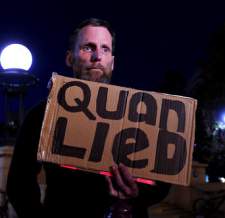fragmentation continues.
Occupy Protests Test the Mayor of Oakland
When Jean Quan was an undergraduate, she once sat for 10 hours inside Sproul Hall at the University of California, Berkeley, demanding better treatment for minority students. As a community activist, she helped unionize hospital workers and organized parents in a poor neighborhood of West Oakland.
At another time, Ms. Quan, the mayor of Oakland, might have joined the hundreds of protesters who have camped out near City Hall as part of Occupy Oakland. Instead, she is now a focus of their wrath. Late Thursday night, protesters chased her from a rally, shouting “Go home,” and refusing to let her speak. The protesters were reacting to her decision to shut down the encampment, which led to a night of street violence on Tuesday, with police unleashing tear gas on the demonstrators. Ms. Quan said the area had become unsanitary and unsafe.
“She raided us. People are hurt for no reason,” said Adam Jordan, an Occupy Oakland organizer, alluding to several people who were injured, including an Iraq war veteran who sustained a severe head wound. “She’s the establishment.”
Ms. Quan’s transformation from one of the more progressive mayors in the country into an object of Occupy Oakland’s scorn has left her isolated and weakened politically. Even her closest friends and supporters questioned her judgment. Dan Siegel, Ms. Quan’s legal adviser who has known her since her days at Berkeley, said he briefly considered resigning over the raid.
But instead of giving in, Ms. Quan is trying to win back the support of the protest community she once called her own.
On Friday, hours after she fled the rally, Ms. Quan said she would not resign. She apologized for a second time and sought to align herself with the Occupy movement, which claims to represent the 99 percent who they say are shut out of a political process that caters to corporations.
“Oakland is definitely part of this 99 percent,” Ms. Quan said.
On Thursday, Ms. Quan had reversed herself and allowed the protesters to resettle in Frank H. Ogawa Plaza, despite the fact that Oakland, facing a $76 million budget deficit, spent an estimated $1 million on cleanup costs and police overtime during the Occupy protest, according to finance officials.
Three-dozen tents were spread across the plaza on Friday morning; there were 150 before Tuesday’s raid. Phil Horne, a San Francisco attorney, was handing out yellow leaflets asking people to sign a petition to recall Ms. Quan as mayor. Her actions last week erased her accomplishments as an activist, he said.
Edwin, a 23-year-old office assistant from San Mateo who declined to give his last name out of concern he would lose his job, said he regretted that Ms. Quan had not been allowed to speak to the protesters. But he said he was not sure whether to forgive her.
“I’m willing to give her a second chance because of her history,” he said. “But if she continues to do what she’s been doing the last two days, I think she needs to go.”
Ms. Quan, who got her start in activism as an undergraduate at Berkeley, clearly has a lot of work to do in order to regain her anti-establishment credibility.
At Berkeley, she gained experience working with the Third World Liberation Front, whose efforts on behalf of minority students led to the establishment of the university’s ethnic studies program.
After Berkeley, Ms. Quan moved to Hong Kong, New York and Los Angeles, working in the labor movement. In 1980, she returned to the Bay Area and led a campaign against the Ku Klux Klan after five anti-Klan protesters were killed in Greensboro, N.C.
In the mid-1980s, Ms. Quan, who by then had two children with her husband, Floyd Huen, helped elect several progressive candidates to the Oakland school board. She then ran herself, and later became school board president before being elected to the City Council.
Mr. Siegel, her legal adviser, said part of her strength as an activist and politician is her tireless approach.
“When Jean runs for office and knocks on doors, the joke that people make is that they’ll vote for her because she won’t leave,” he said. “She’s not afraid when it gets dark, she’s not afraid when there’s an angry dog or if she’s in a sketchy neighborhood. She’s not afraid of a couple of angry people in the plaza.”
Ms. Quan often speaks in short forceful spurts. Since her upset victory last November, which made her the city’s first Asian-American mayor, she has sought to impose a progressive agenda on Oakland, but she has been stymied by polarizing politics, a struggling economy and her city’s 16 percent unemployment rate.
She often clashed with the police, recommending community organizing to offset a police force decimated by budget cuts. On Oct. 11, Chief Anthony Batts abruptly resigned. While he did not blame Ms. Quan directly, he said bureaucracy and micromanaging by city officials had made it impossible for him to do his job.
Long-time allies have encouraged Ms. Quan to embrace Occupy Oakland. Josie Camacho, executive director of the Alameda Labor Council, said she told Ms. Quan: “If we let this movement continue, we will have a lot of pride for stepping out there. And we will have your back. You have to look at things differently.”
Ms. Camacho said it was important to help build the movement, and allow people to stay where they want to stay. “When do you see homeless and students and families come together in a shared space?” she said. “At some point you have to take a risk and at some point you have to take a stand.”
On Thursday, Ms. Quan released a video in which she addressed the protesters directly and emphasized her background as an activist.
“We are a nation in crisis,” she said. “Oakland more than most cities faces budget cuts, unemployment and foreclosures. We are also a Progressive city. And as a long-time civil rights activist and union organizer I want my City to support the movement.”
On Friday, after fleeing from the rally, Ms. Quan decided she would not let up. She continued to court the protesters.
“This is a tough job,” she said. “I wanted to talk to them. I still want to talk to them and we stand ready to talk to them any time.”
Joe M. writes:
Tim W. writes:
Ed H. writes:

